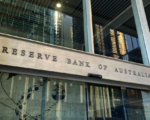Hawkish Shift Anticipated at the Bank of Japan (BOJ)
Investors are increasingly betting that the Bank of Japan (BOJ) will adopt a more hawkish stance in response to the yen’s continued depreciation. Market activity reflects these expectations, with investors shorting Japanese government bonds, buying bank stocks, and speculating on rate hikes as early as next month.
The yen’s current level of 154 to the dollar, close to figures that previously prompted intervention and a rate hike, has heightened market sensitivity. “There seems to be a lot more attention and sensitivity being paid around the BOJ,” noted Shinji Ogawa of J.P. Morgan in Tokyo.
Key Market Indicators and Movements
- Rate Hike Speculation: The probability of a 25-basis-point hike in December has risen significantly, from negligible to approximately 54% over the past weeks.
- Bank Shares Surge: Tokyo bank shares have gained roughly 13% in two weeks, outperforming the broader market. Banks stand to benefit directly from potential rate increases.
- Foreign Exchange Positioning: Hedge funds and speculators are building positions against the yen, anticipating further depreciation.
Impact on Japanese Equities
Investors are focusing on mid-cap and banking stocks, which could benefit from wage inflation and higher interest rates. Additionally, yen weakness may bolster large-cap exporters’ earnings, especially in cyclical sectors like machinery and industrials.
George Efstathopoulos of Fidelity International remarked, “More recently, we are also turning more constructive on broader Japan large caps, as yen weakness should translate into a better earnings picture.”
Yen’s Influence on Policy and Markets
The yen’s depreciation, exceeding 30% against the dollar since 2021, has significant implications for Japan’s inflation and monetary policy. BOJ Governor Kazuo Ueda made limited reference to the currency in a recent policy speech, but market participants believe the yen’s fall may pressure the BOJ into earlier action.
“In light of the recent performance of the Japanese yen, the BOJ might need to re-evaluate whether they need to be more hawkish,” said Nathan Swami of Citi.
Historical Context and Investor Caution
Memories of August’s market turbulence, when the yen’s sudden surge triggered the Nikkei’s sharpest one-day drop since 1987, loom large. Investors remain wary of similar volatility.
Foreign investors, however, may find opportunities if yen depreciation stabilizes. “Global investors have to worry about where this yen depreciation may stop,” noted Citi’s Keita Matsumoto, adding that stabilization could benefit dollar-denominated returns in Japanese equities.


















